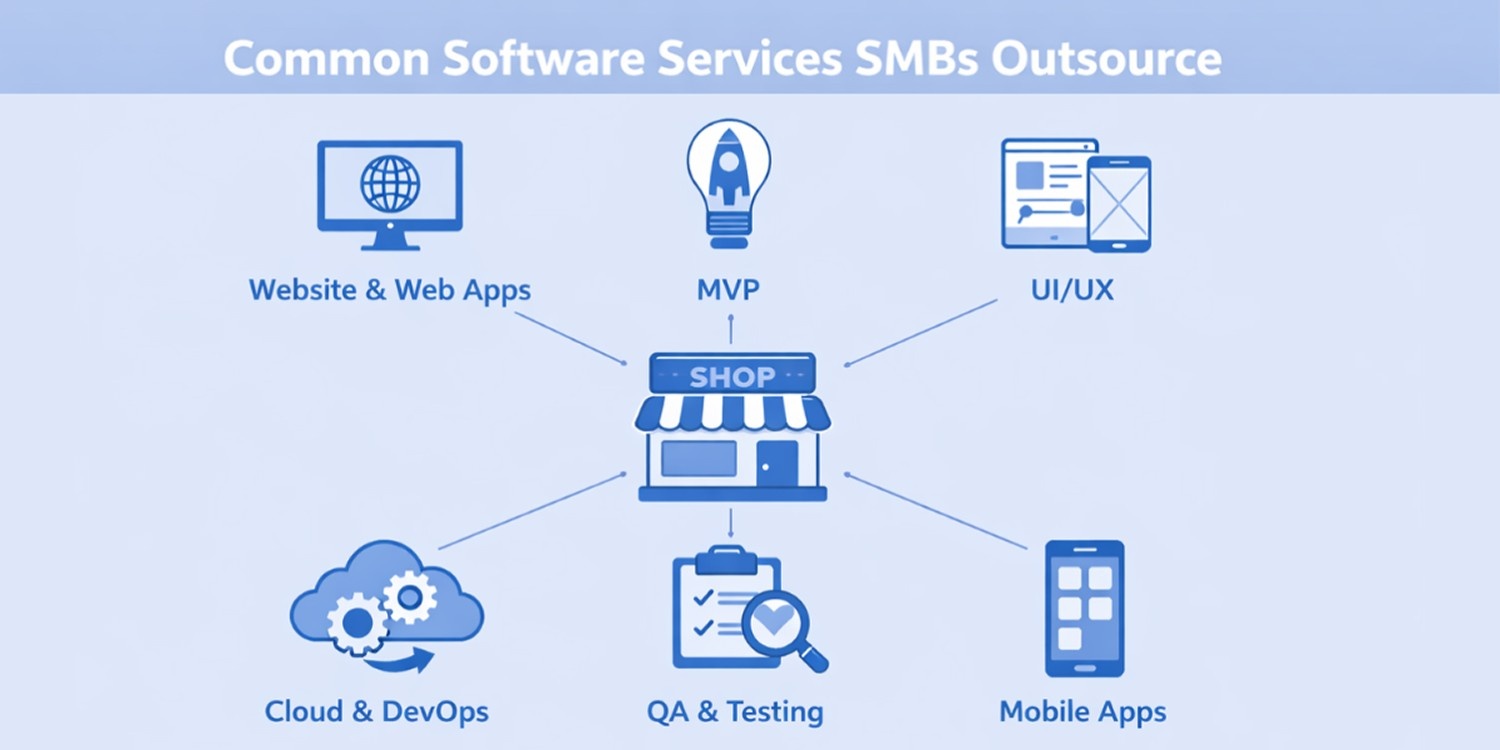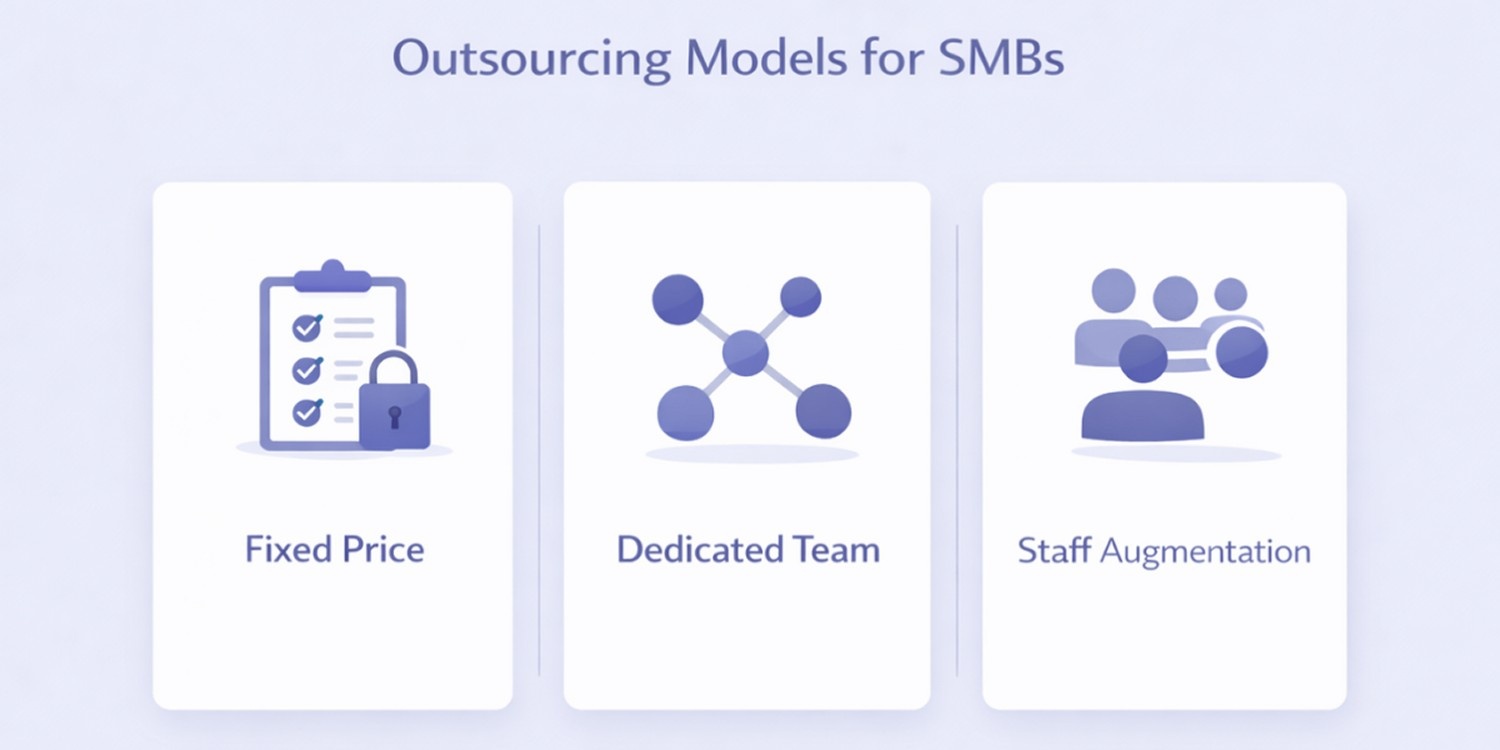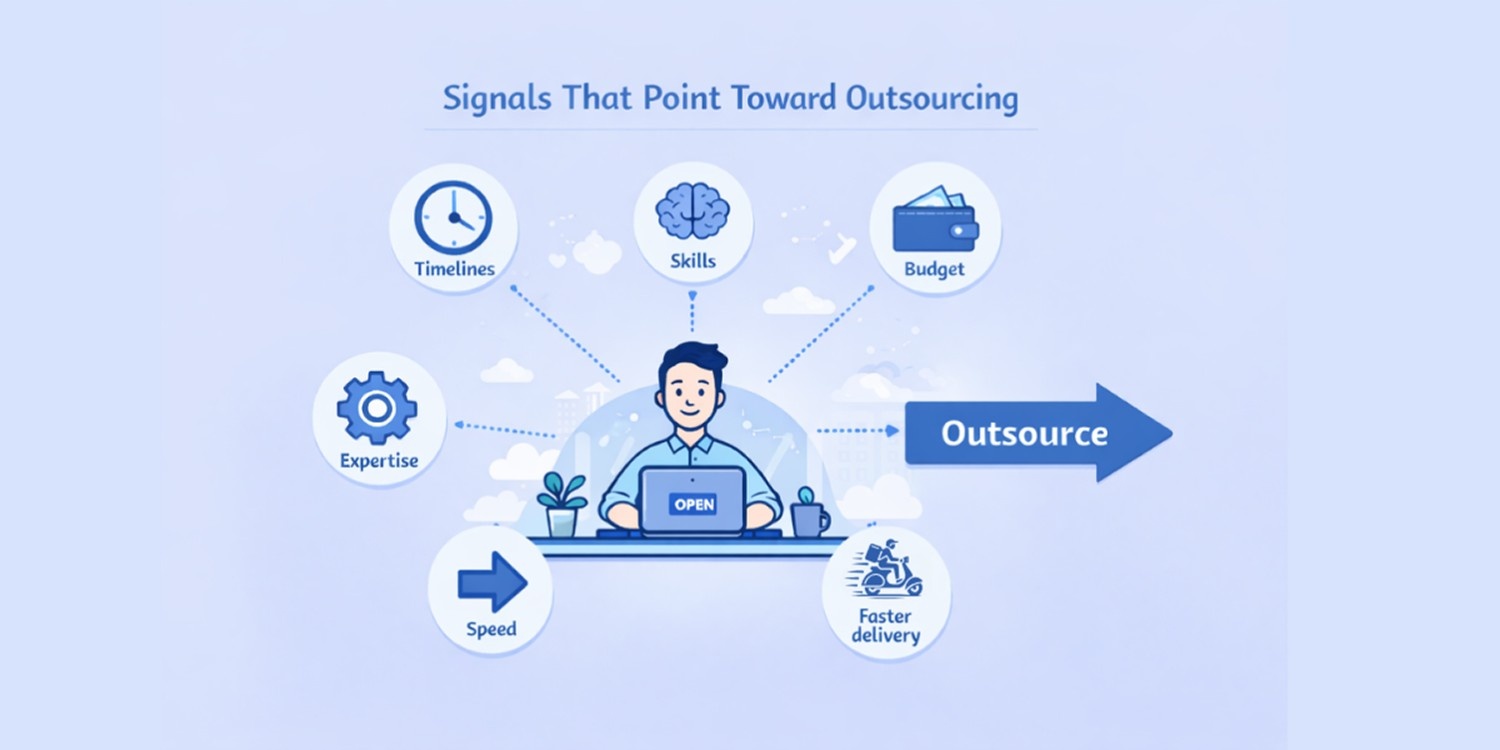When and How Small Businesses Should Outsource Software

Software Outsourcing for Small Businesses
Outsourcing has moved from an occasional fix to a core way small businesses operate. Instead of trying to hire for every skill, many owners now rely on external teams to handle software development, IT systems, cloud, integrations, and technical maintenance. For small firms, outsourcing is no longer peripheral it has become a standard way of getting technical work done.
Research from Mordor Intelligence estimates that the global outsourcing market reached about $1.09 trillion in 2025, underscoring how deeply businesses now depend on outside expertise across industries, often sourced from leading software outsourcing countries around the world.
At the same time, data compiled by Stealth Agents shows that over 37% of small businesses already outsource at least one core function, most commonly in technology, marketing, and finance.
These numbers point to a broader shift: small businesses are building capability through partnerships rather than payroll.
Key Software Services Small Businesses Outsource

Software now underpins how companies attract customers, deliver value, and operate every day. In that reality, software outsourcing has moved from an occasional fix to a core way startups and growing firms build capability quickly, especially when they can access strong technical talent in markets with more favorable exchange rates.
Many founders rely on external software teams because they get skilled, STEM-trained developers at a cost structure that would be difficult to match locally.
AI Development
Many small businesses now need intelligent features such as chatbots, recommendation systems, document processing, or intelligent search to stay competitive. These capabilities usually require specialized AI skills that most internal teams do not maintain full-time.
Outsourcing AI development lets companies build and deploy machine learning models and data pipelines without creating a full in-house data team, while internal teams focus on product decisions and customer outcomes.
Mobile App Development
Many businesses reach customers primarily through mobile devices, yet few small teams have in-house expertise in iOS and Android. Building and maintaining apps requires specialized frameworks, device testing, and ongoing updates that quickly stretch internal capacity.
For this reason, companies often outsource mobile app development to deliver polished apps faster, support multiple platforms efficiently, and avoid the cost of hiring separate mobile teams too early.
MVP / First Digital Product
Moving from concept to a working product is one of the hardest steps for any tech-led team. Building an MVP internally can slow progress as founders juggle hiring, setup, and development while trying to validate demand.
Outsourcing MVP development allows teams to ship a functional product faster, learn from early usage, and refine direction without long internal hiring cycles or upfront technical overhead.
Software & IT Development
Once a product concept and design are in place, the real technical build begins with backend systems, APIs, integrations, and data logic. Handling all of this internally often stretches small teams too thin and slows delivery.
Outsourcing software and IT development gives businesses access to experienced engineers without slowing internal decision-making. For many teams, that work is carried out through offshore software development, where deeper talent pools support steady execution. This keeps delivery moving without long-term hiring risk.
Cloud & DevOps
Once software goes live, infrastructure becomes as important as the product itself. Poor hosting, slow deployments, or weak security can break the user experience. Most small teams do not have dedicated expertise to manage cloud environments full-time.
Outsourcing Cloud and DevOps allows businesses to keep systems stable, secure, and production-ready while avoiding early permanent platform hires and keeping internal teams focused on building features instead of managing servers.
QA & Testing
As products grow, even small changes can break existing features, and internal teams rarely have time for structured testing. Bugs in production can hurt user trust, increase support costs, and slow releases.
Outsourcing QA and testing helps businesses catch issues before launch, ensure stability across devices and environments, and ship updates with greater confidence without building a full in-house testing team.
Website & Web Applications
A website or web application is often the most visible and revenue-critical system a business runs. Once it includes logins, payments, dashboards, or integrations, it stops being a simple site and becomes infrastructure that requires ongoing upkeep.
For that reason, many companies outsource website and web application development so they can launch faster, avoid template limits, and keep internal teams focused on customers and growth while external specialists handle technical execution and maintenance.
Technical Consulting & Architecture
Before any code is written, key decisions about system design, tech stack, and integrations shape the success of a project. Without experienced guidance, small teams risk choosing tools that create bottlenecks later.
Outsourcing technical consulting helps businesses define a clear architecture, reduce rework, and build on a solid foundation while keeping internal teams focused on product and customers.
Software Outsourcing Models That Work for SMBs

Small businesses today compete with far larger players by using smart ways of organizing software work, and outsourcing has become one of the most effective tools to do that. Instead of trying to build everything internally, many SMBs now use external software teams to move faster, access better talent, and deliver stronger digital products while keeping control over strategy and outcomes.
The model you choose should match how clear your scope is, how long you need support, and how much day-to-day technical ownership you want to keep. The outsourcing models overview below is meant to help you navigate that choice with clarity.
Fixed-Price Model
This model works best when a business knows what it wants to build and can clearly define the outcome, for example, a new website, a well-scoped MVP, or a defined set of product features. It allows small businesses to move forward with confidence instead of worrying about open-ended timelines or unpredictable costs.
With fixed-price outsourcing, companies get professional delivery, predictable budgets, and faster execution while keeping internal teams focused on customers and growth rather than day-to-day technical coordination.
Dedicated Team Model
For businesses building and improving a product over time, a dedicated team becomes a long-term growth partner rather than a one-off vendor. This approach is especially useful for SaaS products, digital platforms, and companies that release features regularly.
A dedicated external team operates like an extension of your organization, deeply understanding your product, shipping consistently, and supporting continuous development while you retain control over strategy and priorities.
Staff Augmentation
When an SMB already has internal engineers but needs additional skills or temporary capacity, staff augmentation offers a flexible way to strengthen the team. Instead of expanding permanent headcount, businesses bring in targeted expertise only when needed.
This model allows companies to keep technical ownership in-house while adding specialized talent, such as backend, cloud, or QA, to accelerate delivery without long-term commitments.
When SMBs Should Consider Software Outsourcing

Software stops being supported the moment it starts deciding how fast you can grow. When features, integrations, deployments, or bugs begin dictating your pace, the bottleneck is no longer your idea, it is your delivery capacity.
At that point, outsourcing is not a convenience; it is the fastest way for small businesses to keep momentum without losing control of their product or cash flow. Here are the clear moments when outsourcing becomes the smartest move.
Skill Gaps
If your project requires deep expertise in cloud, integrations, APIs, security, or complex backend work, building that capability in-house from scratch is slow and expensive. Outsourcing fills those gaps instantly with experienced engineers.
Budget Reality
Full-time engineering salaries, recruitment costs, tools, and infrastructure quickly strain small company budgets. Outsourcing lets you pay for outcomes instead of payroll, keeping spend aligned with real progress.
Team Flexibility
Software needs spike during builds and drop after launch. Outsourcing lets you scale capacity up or down without permanent headcount, notice periods, or idle bench time.
Founder Focus
When leadership gets pulled into technical fixes, product momentum stalls. Outsourcing keeps coding, integrations, and maintenance off your plate so founders can focus on customers, sales, and product direction.
Delivery Reliability
External teams bring structured testing, deployment processes, and documentation that many small internal teams don’t yet have. This results in fewer production issues and smoother releases.
Lower Hiring Risk
One bad technical hire can derail a small company for months. With outsourcing, skills can be adjusted based on performance and project needs without long-term exposure.
Common Outsourcing Pitfalls and How SMBs Avoid Them
Outsourcing usually fails not because of technology, but because of misaligned expectations, unclear scope, or weak ways of working. The companies that get the most value from software outsourcing don’t avoid problems entirely, they design their engagement so problems are less likely to happen in the first place.
Below are the pitfalls small businesses most commonly face, and how successful teams prevent them in practice.
Vague Scope
Projects run into trouble when goals are loosely defined and keep shifting mid-way. This is most common when companies start by just building it instead of agreeing on outcomes, milestones, and priorities. The result is scope creep, missed deadlines, and frustration on both sides.
SMBs avoid this by defining one clear priority outcome before starting, for example, launching an MVP in 8 weeks or stabilizing payments. They lock milestones in writing and treat major changes as a new phase, not a running debate.
Poor Communication
Delays often come from unclear communication rather than technical limits, misinterpreted requirements, late feedback, or scattered tools. This tends to happen when expectations about updates, meetings, and decision-making aren’t set upfront.
Smart teams prevent this by agreeing on simple ways of working early a weekly sprint rhythm, one main communication channel, and a clear decision-maker on the business side. When communication is predictable, delivery becomes predictable.
No Ownership
Some engagements fail because no one clearly owns quality, documentation, or long-term maintenance. This is common when outsourcing is treated as task-based freelancing instead of a structured partnership.
Companies that avoid this work with partners who take clear technical ownership, including code standards, testing, and handover documentation, so the system remains reliable even after the initial build.
Misaligned Model
Problems arise when the engagement model doesn’t match the work. Fixed-price contracts struggle with evolving products, while staff augmentation can feel chaotic if there is no internal technical leadership.
SMBs reduce friction by aligning the model with reality:
- Fixed price for clear projects
- Dedicated team for evolving products
- Staff augmentation when internal engineers exist but need support.
Choosing the right model upfront prevents many downstream conflicts.
Zero Metrics
Many teams track hours worked instead of business outcomes, which hides whether outsourcing is actually helping. This leads to confusion about value, even when work is happening.
Effective teams define success in simple, measurable terms: faster releases, fewer bugs, improved uptime, or quicker feature delivery. When outcomes are clear, the partnership stays aligned.
How SMBs Actually Use Software Outsourcing
Understanding Software Outsourcing Costs
When small businesses outsource software work, the focus quickly shifts from hourly rates to overall cost behaviour. According to Agilie’s 2026 outlook on the global outsourcing market, the IT and software outsourcing industry is projected to reach around USD 651 billion, reflecting how deeply companies now rely on external teams for both building and maintaining software, rather than hiring full-time staff
Clarity of scope, not hours worked
When requirements are well defined, pricing tends to stay stable. When priorities keep shifting, costs rise because the work itself keeps expanding. SMBs consistently spend less when they start with one clear goal, for example, launching an MVP, instead of trying to build everything at once.
Team mix matters more than team size
Costs depend more on who you need than how many people you need. A simple web build may require a small balanced team, while a cloud-heavy product needs more senior backend and DevOps skills. Two teams of the same size can therefore vary significantly in total cost based on expertise.
One-time build vs ongoing work
Most software does not end at launch. There is usually a higher initial build phase followed by steadier maintenance and updates. Businesses that budget only for the build often feel surprised later; those that plan for both phases experience fewer cost shocks.
Conclusion: Outsourcing Right and Why Code-B Matters
Software outsourcing has become a practical way for small businesses to move faster without ballooning payroll or losing focus. When teams are clear on scope, choose the right model, and work with disciplined partners, outsourcing turns technical complexity into real operational advantage. It is no longer a backup option, it is how many growing companies build and deliver software today.
The strongest teams don’t outsource everything; they outsource deliberately. They keep strategy in-house, hand off execution where it makes sense, and build relationships that last beyond a single project. In practice, success comes from alignment, consistency, and shared accountability rather than one-off transactions.
That deliberate approach is what shapes how work gets done at Code-B. Much of what we build sits in areas where delivery breaks down easily for small teams, AI-driven features, mobile applications, cloud infrastructure, and machine-learning systems that need to run reliably in production. These are not one-off builds; they require steady engineering ownership, clear handoffs, and teams that understand how software behaves after launch, not just during development.
When outsourcing works at this level, it stops feeling like delegation and starts feeling like momentum. Software moves forward without constant escalation, decisions translate into execution, and growth is no longer limited by delivery capacity. That is the role outsourcing should play, and the standard we apply to our work at Code-B.
.svg)
